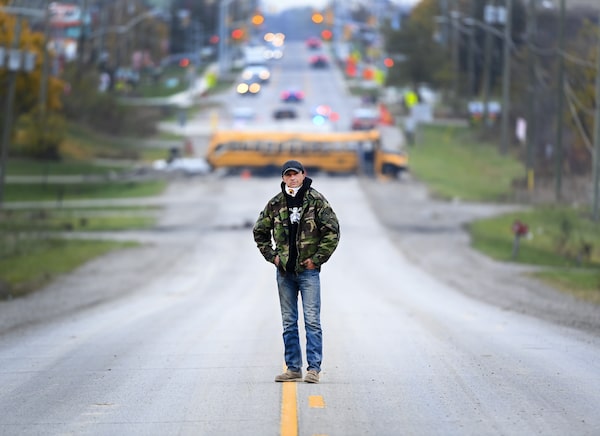
Mohawk Skyler Williams near the construction site at the centre of an Indigenous land dispute in Caledonia, Ont., on October 29, 2020.Nathan Denette/The Canadian Press
An injunction ordering a group of Indigenous people to permanently leave the site of a proposed housing development has been cancelled after Ontario’s Court of Appeal found a judge acted unfairly towards a member of the group during court proceedings.
The decision released Tuesday said the Superior Court judge who heard the October 2020 motion erred when he denied an Indigenous man’s rights to procedural fairness and the opportunity to be heard.
The group that set up camp at the proposed housing development site near Caledonia, Ont., and Six Nations of the Grand River argued the project was on Haudenosaunee land and refused to leave.
Skyler Williams, a spokesman for the camp known as 1492 Land Back Lane, was named on the injunction order that sought to remove people.
During a hearing in the fall of 2020, Justice John Harper barred Williams from participating or making legal arguments because he determined Williams and others were in contempt of previous orders to leave the site. Harper granted a permanent injunction to the company looking to build a subdivision on the land and another to Haldimand County that barred people from blocking public roads.
Justice Lorne Sossin’s written Appeal Court decision found that it was unfair of Harper to bar Williams from participating. He set aside the injunction order and costs that Williams was ordered to pay in the matter.
The judgment said Harper did not properly inform Williams about the exact details of the proceeding against him and did not give him an opportunity to consult legal counsel or respond to allegations.
Sossin noted that Williams was brought into the litigation, was self-represented and the court order carried serious consequences for him, all factors that made it unfair to remove him from the proceedings.
Sossin also found said that Williams was not afforded his right to raise issues about Indigenous legal claims and the rule of law, which he had sought to do.
The judgment found that Harper was wrong to order Williams to pay costs of more than $140,000 to the development company and Haldimand County, and set those aside. Williams was granted the costs of his legal fees.
In a Tuesday statement, an executive at one of the companies behind developer Foxgate said the company did not intend to bar Williams from the proceedings.
William Liske of Losani Homes said Foxgate welcomed the decision because it “will ultimately allow all parties to be heard,” though he said Foxgate disagrees with some of the Appeal Court’s findings.
A developer behind the planned subdivision said this summer that the project wouldn’t go ahead due to the ongoing land dispute.
Police have arrested dozens of people including protesters and a journalist covering the story since the occupation began in July 2020.
Our Morning Update and Evening Update newsletters are written by Globe editors, giving you a concise summary of the day’s most important headlines. Sign up today.